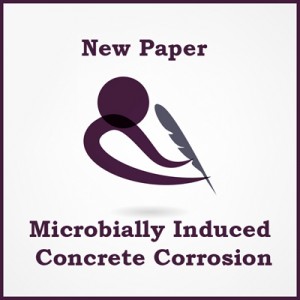Back in May we posted about a Gizmodo article entitled “Concrete-Dissolving Bacteria Are Destroying Our Nation’s Sewers”. This article highlighted Sloan-funded work by Mark Hernandez and others that describes some of the biochemistry and microbiology behind concrete corrosion in sewers. A (fee-required) paper describing that work has just come out, with a press release focused on the prevention aspect of this work (surveying the microbial community for indicators of corrosion). Abstract below:
The microbial communities associated with deteriorating concrete corrosion fronts were characterized in 36 samples taken from wastewater collection and treatment systems in ten utilities. Bacterial communities were described using Illumina MiSeq sequencing of the V1V2 region of small subunit ribosomal RNA (SSU-rRNA) gene recovered from fresh corrosion products. Headspace gas concentrations (hydrogen sulfide, carbon dioxide, and methane), pore water pH, moisture content, and select mineralogy were tested for correlation to community outcomes and corrosion extent using pairwise linear regressions and canonical correspondence analysis. Corroding concrete was most commonly characterized by moisture contents greater than 10%, pore water pH below one, and limited richness (<10 taxa). Bacterial community composition was not correlated to geographic location when considered independently from other environmental factors. Corrosion was most severe in sites with high levels of hydrogen sulfide (>100 ppm) and carbon dioxide (>1%) gasses, conditions which also were associated with low diversity biofilms dominated by members of the acidophilic sulfur-oxidizer genus Acidithiobacillus.
